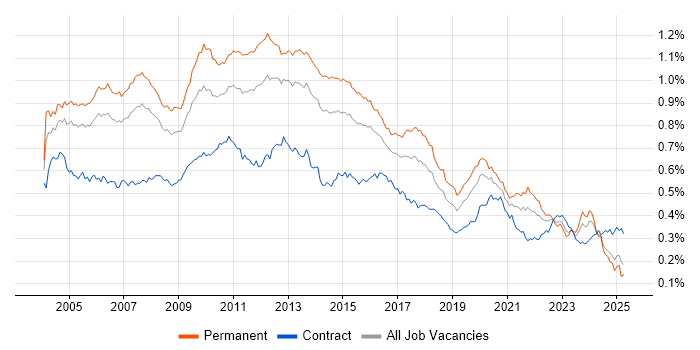Application Developer
UK
The median Application Developer salary in the UK is £60,000 per year, according to job vacancies posted during the 6 months leading to 9 May 2025.
The table below provides salary benchmarking and summary statistics, comparing them to the same period in the previous two years.
| 6 months to 9 May 2025 |
Same period 2024 | Same period 2023 | |
|---|---|---|---|
| Rank | 606 | 493 | 647 |
| Rank change year-on-year | -113 | +154 | -30 |
| Permanent jobs requiring an Applications Developer | 84 | 456 | 344 |
| As % of all permanent jobs advertised in the UK | 0.16% | 0.46% | 0.34% |
| As % of the Job Titles category | 0.17% | 0.49% | 0.37% |
| Number of salaries quoted | 67 | 377 | 260 |
| 10th Percentile | £42,500 | £35,000 | £36,713 |
| 25th Percentile | £48,750 | £41,000 | £46,250 |
| Median annual salary (50th Percentile) | £60,000 | £52,500 | £57,500 |
| Median % change year-on-year | +14.29% | -8.70% | +9.52% |
| 75th Percentile | £75,000 | £64,750 | £74,063 |
| 90th Percentile | £89,000 | £65,000 | £89,867 |
| UK excluding London median annual salary | £60,000 | £50,000 | £52,500 |
| % change year-on-year | +20.00% | -4.76% | +5.00% |
All Permanent IT Job Vacancies
UK
For comparison with the information above, the following table provides summary statistics for all permanent IT job vacancies. Most job vacancies include a discernible job title that can be normalized. As such, the figures in the second row provide an indication of the number of permanent jobs in our overall sample.
| Permanent vacancies in the UK with a recognized job title | 49,007 | 93,784 | 92,686 |
| % of permanent jobs with a recognized job title | 90.47% | 94.63% | 91.46% |
| Number of salaries quoted | 27,411 | 67,216 | 58,370 |
| 10th Percentile | £30,000 | £28,500 | £32,500 |
| 25th Percentile | £41,375 | £38,500 | £45,000 |
| Median annual salary (50th Percentile) | £57,500 | £52,500 | £60,000 |
| Median % change year-on-year | +9.52% | -12.50% | - |
| 75th Percentile | £75,000 | £71,250 | £81,250 |
| 90th Percentile | £97,500 | £90,000 | £100,000 |
| UK excluding London median annual salary | £52,000 | £50,000 | £53,000 |
| % change year-on-year | +4.00% | -5.66% | +6.00% |
Applications Developer
Job Vacancy Trend
Job postings that featured Applications Developer in the job title as a proportion of all IT jobs advertised.

Applications Developer
Salary Trend
3-month moving average salary quoted in jobs citing Applications Developer.
Applications Developer
Salary Histogram
Salary distribution for jobs citing Applications Developer over the 6 months to 9 May 2025.
Applications Developer
Top 15 Job Locations
The table below looks at the demand and provides a guide to the median salaries quoted in IT jobs citing Applications Developer within the UK over the 6 months to 9 May 2025. The 'Rank Change' column provides an indication of the change in demand within each location based on the same 6 month period last year.
| Location | Rank Change on Same Period Last Year |
Matching Permanent IT Job Ads |
Median Salary Past 6 Months |
Median Salary % Change on Same Period Last Year |
Live Jobs |
|---|---|---|---|---|---|
| England | -116 | 77 | £60,000 | +14.29% | 109 |
| UK excluding London | -62 | 62 | £60,000 | +20.00% | 67 |
| Work from Home | -28 | 41 | £60,000 | +14.29% | 66 |
| London | +67 | 22 | £63,000 | +0.80% | 51 |
| Midlands | +49 | 22 | £58,750 | -2.08% | 7 |
| West Midlands | +52 | 15 | £60,000 | - | 5 |
| South East | +26 | 15 | £50,000 | -16.67% | 23 |
| East Midlands | +38 | 7 | £52,500 | -19.23% | 2 |
| East of England | +13 | 7 | £66,219 | +65.55% | 10 |
| North of England | -12 | 7 | £72,500 | +64.77% | 24 |
| Scotland | +126 | 6 | £75,000 | +57.89% | 1 |
| Yorkshire | +30 | 5 | £72,500 | +84.71% | 5 |
| South West | +20 | 4 | £45,000 | -4.17% | 6 |
| North West | -18 | 2 | £53,750 | -2.27% | 20 |
| Northern Ireland | +36 | 1 | - | - |
Applications Developer Skill Set
Top 30 Co-occurring Skills and Capabilities
For the 6 months to 9 May 2025, Applications Developer job roles required the following skills and capabilities in order of popularity. The figures indicate the absolute number co-occurrences and as a proportion of all permanent job ads featuring Applications Developer in the job title.
|
|
Applications Developer Skill Set
Co-occurring Skills and Capabilities by Category
The follow tables expand on the table above by listing co-occurrences grouped by category. The same employment type, locality and period is covered with up to 20 co-occurrences shown in each of the following categories:
|
|
|||||||||||||||||||||||||||||||||||||||||||||||||||||||||||||||||||||||||||||||||||||||||||||||||||||||||
|
|
|||||||||||||||||||||||||||||||||||||||||||||||||||||||||||||||||||||||||||||||||||||||||||||||||||||||||
|
|
|||||||||||||||||||||||||||||||||||||||||||||||||||||||||||||||||||||||||||||||||||||||||||||||||||||||||
|
|
|||||||||||||||||||||||||||||||||||||||||||||||||||||||||||||||||||||||||||||||||||||||||||||||||||||||||
|
|
|||||||||||||||||||||||||||||||||||||||||||||||||||||||||||||||||||||||||||||||||||||||||||||||||||||||||
|
|
|||||||||||||||||||||||||||||||||||||||||||||||||||||||||||||||||||||||||||||||||||||||||||||||||||||||||
|
|
|||||||||||||||||||||||||||||||||||||||||||||||||||||||||||||||||||||||||||||||||||||||||||||||||||||||||
|
|
|||||||||||||||||||||||||||||||||||||||||||||||||||||||||||||||||||||||||||||||||||||||||||||||||||||||||
|
|
|||||||||||||||||||||||||||||||||||||||||||||||||||||||||||||||||||||||||||||||||||||||||||||||||||||||||
